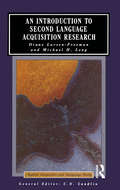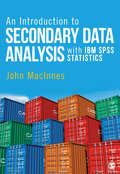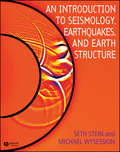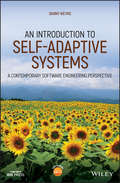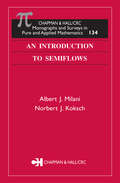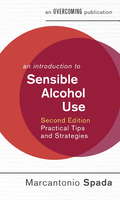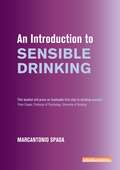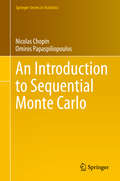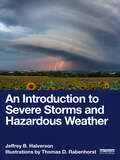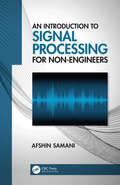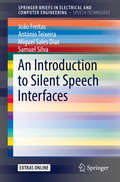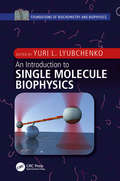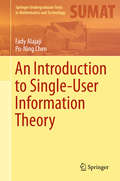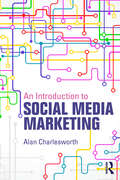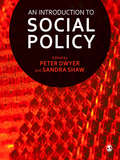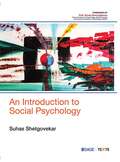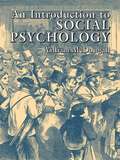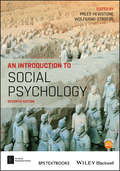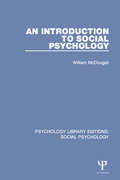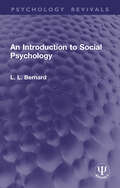- Table View
- List View
An Introduction to Second Language Acquisition Research (Applied Linguistics and Language Study)
by Diane Larsen-Freeman Michael H. LongUnderstanding how people learn and fail to learn second and foreign languages is increasingly recognised as a critical social and psycholinguistic issue. Second languages are vitally important to diverse groups of people, ranging from refugees to college students facing foreign language requirements. This book provides a synthesis of empirical findings on second and foreign language learning by children and adults, emphasising the design and execution of appropriate research.
An Introduction to Secondary Data Analysis with IBM SPSS Statistics
by Professor John MacInnesMany professional, high-quality surveys collect data on people's behaviour, experiences, lifestyles and attitudes. The data they produce is more accessible than ever before. This book provides students with a comprehensive introduction to using this data, as well as transactional data and big data sources, in their own research projects. Here you will find all you need to know about locating, accessing, preparing and analysing secondary data, along with step-by-step instructions for using IBM SPSS Statistics. You will learn how to: Create a robust research question and design that suits secondary analysis Locate, access and explore data online Understand data documentation Check and 'clean' secondary data Manage and analyse your data to produce meaningful results Replicate analyses of data in published articles and books Using case studies and video animations to illustrate each step of your research, this book provides you with the quantitative analysis skills you'll need to pass your course, complete your research project and compete in the job market. Exercises throughout the book and on the book's companion website give you an opportunity to practice, check your understanding and work hands on with real data as you're learning.
An Introduction to Secondary Data Analysis with IBM SPSS Statistics
by Professor John MacInnesMany professional, high-quality surveys collect data on people's behaviour, experiences, lifestyles and attitudes. The data they produce is more accessible than ever before. This book provides students with a comprehensive introduction to using this data, as well as transactional data and big data sources, in their own research projects. Here you will find all you need to know about locating, accessing, preparing and analysing secondary data, along with step-by-step instructions for using IBM SPSS Statistics. You will learn how to: Create a robust research question and design that suits secondary analysis Locate, access and explore data online Understand data documentation Check and 'clean' secondary data Manage and analyse your data to produce meaningful results Replicate analyses of data in published articles and books Using case studies and video animations to illustrate each step of your research, this book provides you with the quantitative analysis skills you'll need to pass your course, complete your research project and compete in the job market. Exercises throughout the book and on the book's companion website give you an opportunity to practice, check your understanding and work hands on with real data as you're learning.
An Introduction to Seismology, Earthquakes, and Earth Structure
by Michael Wysession Seth SteinAn Introduction to Seismology, Earthquakes and Earth Structures is an introduction to seismology and its role in the earth sciences, and is written for advanced undergraduate and beginning graduate students. The fundamentals of seismic wave propagation are developed using a physical approach and then applied to show how refraction, reflection, and teleseismic techniques are used to study the structure and thus the composition and evolution of the earth. The book shows how seismic waves are used to study earthquakes and are integrated with other data to investigate the plate tectonic processes that cause earthquakes. Figures, examples, problems, and computer exercises teach students about seismology in a creative and intuitive manner. Necessary mathematical tools including vector and tensor analysis, matrix algebra, Fourier analysis, statistics of errors, signal processing, and data inversion are introduced with many relevant examples. The text also addresses the fundamentals of seismometry and applications of seismology to societal issues. Special attention is paid to help students visualize connections between different topics and view seismology as an integrated science. An Introduction to Seismology, Earthquakes, and Earth Structure gives an excellent overview for students of geophysics and tectonics, and provides a strong foundation for further studies in seismology. Multidisciplinary examples throughout the text - catering to students in varied disciplines (geology, mineralogy, petrology, physics, etc.). Most up to date book on the market - includes recent seismic events such as the 1999 Earthquakes in Turkey, Greece, and Taiwan). Chapter outlines - each chapter begins with an outline and a list of learning objectives to help students focus and study. Essential math review - an entire section reviews the essential math needed to understand seismology. This can be covered in class or left to students to review as needed. End of chapter problem sets - homework problems that cover the material presented in the chapter. Solutions to all odd numbered problem sets are listed in the back so that students can track their progress. Extensive References - classic references and more current references are listed at the end of each chapter. A set of instructor's resources containing downloadable versions of all the figures in the book, errata and answers to homework problems is available at: http://levee.wustl.edu/seismology/book/. Also available on this website are PowerPoint lecture slides corresponding to the first 5 chapters of the book.
An Introduction to Self-adaptive Systems: A Contemporary Software Engineering Perspective (Wiley - IEEE)
by Danny WeynsA concise and practical introduction to the foundations and engineering principles of self-adaptation Though it has recently gained significant momentum, the topic of self-adaptation remains largely under-addressed in academic and technical literature. This book changes that. Using a systematic and holistic approach, An Introduction to Self-adaptive Systems: A Contemporary Software Engineering Perspective provides readers with an accessible set of basic principles, engineering foundations, and applications of self-adaptation in software-intensive systems. It places self-adaptation in the context of techniques like uncertainty management, feedback control, online reasoning, and machine learning while acknowledging the growing consensus in the software engineering community that self-adaptation will be a crucial enabling feature in tackling the challenges of new, emerging, and future systems. The author combines cutting-edge technical research with basic principles and real-world insights to create a practical and strategically effective guide to self-adaptation. He includes features such as: An analysis of the foundational engineering principles and applications of self-adaptation in different domains, including the Internet-of-Things, cloud computing, and cyber-physical systems End-of-chapter exercises at four different levels of complexity and difficulty An accompanying author-hosted website with slides, selected exercises and solutions, models, and code Perfect for researchers, students, teachers, industry leaders, and practitioners in fields that directly or peripherally involve software engineering, as well as those in academia involved in a class on self-adaptivity, this book belongs on the shelves of anyone with an interest in the future of software and its engineering.
An Introduction to Semiflows
by Albert J. Milani Norbert J. KokschThis book introduces the class of dynamical systems called semiflows, which includes systems defined or modeled by certain types of differential evolution equations (DEEs). It focuses on the basic results of the theory of dynamical systems that can be extended naturally and applied to study the asymptotic behavior of the solutions of DEEs. The auth
An Introduction to Sensible Alcohol Use, 2nd Edition: Practical Tips and Strategies
by Marcantonio SpadaLearn how to manage your alcohol use simply and effectivelyFor many, drinking can be a pleasurable, acceptable and harmless social activity. However, if you regularly drink more than is sensible you may find that it impacts on your health, emotional wellbeing, relationships and your ability to work. There are many reasons why we drink and this self-help guide uses clinically proven cognitive behavioural therapy (CBT) techniques to help you to work out your own reasons and to start taking control of your alcohol use: Understand what is sensible alcohol useBuild the motivation to change your habitsTackle thoughts about drinkingManage setbacks
An Introduction to Sensible Alcohol Use, 2nd Edition: Practical Tips and Strategies (An Introduction to Coping series)
by Marcantonio SpadaLearn how to manage your alcohol use simply and effectivelyFor many, drinking can be a pleasurable, acceptable and harmless social activity. However, if you regularly drink more than is sensible you may find that it impacts on your health, emotional wellbeing, relationships and your ability to work. There are many reasons why we drink and this self-help guide uses clinically proven cognitive behavioural therapy (CBT) techniques to help you to work out your own reasons and to start taking control of your alcohol use: Understand what is sensible alcohol useBuild the motivation to change your habitsTackle thoughts about drinkingManage setbacks
An Introduction to Sensible Drinking (An Introduction to Coping series)
by Marcantonio SpadaLearn how to manage your alcohol use simply and effectivelyFor many, drinking can be a pleasurable, acceptable and harmless social activity. However, if you regularly drink more than is sensible you may find that it impacts on your health, emotional wellbeing, relationships and your ability to work. There are many reasons why we drink and this self-help guide uses clinically proven cognitive behavioural therapy (CBT) techniques to help you to work out your own reasons and to start taking control of your alcohol use: Understand what is sensible alcohol useBuild the motivation to change your habitsTackle thoughts about drinkingManage setbacks
An Introduction to Sensible Drinking: Practical Tips and Strategies (Overcoming Ser.)
by Marcantonio SpadaLearn how to manage your alcohol use simply and effectivelyFor many, drinking can be a pleasurable, acceptable and harmless social activity. However, if you regularly drink more than is sensible you may find that it impacts on your health, emotional wellbeing, relationships and your ability to work. There are many reasons why we drink and this self-help guide uses clinically proven cognitive behavioural therapy (CBT) techniques to help you to work out your own reasons and to start taking control of your alcohol use: Understand what is sensible alcohol useBuild the motivation to change your habitsTackle thoughts about drinkingManage setbacks
An Introduction to Sequential Monte Carlo (Springer Series in Statistics)
by Nicolas Chopin Omiros PapaspiliopoulosThis book provides a general introduction to Sequential Monte Carlo (SMC) methods, also known as particle filters. These methods have become a staple for the sequential analysis of data in such diverse fields as signal processing, epidemiology, machine learning, population ecology, quantitative finance, and robotics.The coverage is comprehensive, ranging from the underlying theory to computational implementation, methodology, and diverse applications in various areas of science. This is achieved by describing SMC algorithms as particular cases of a general framework, which involves concepts such as Feynman-Kac distributions, and tools such as importance sampling and resampling. This general framework is used consistently throughout the book.Extensive coverage is provided on sequential learning (filtering, smoothing) of state-space (hidden Markov) models, as this remains an important application of SMC methods. More recent applications, such as parameter estimation of these models (through e.g. particle Markov chain Monte Carlo techniques) and the simulation of challenging probability distributions (in e.g. Bayesian inference or rare-event problems), are also discussed.The book may be used either as a graduate text on Sequential Monte Carlo methods and state-space modeling, or as a general reference work on the area. Each chapter includes a set of exercises for self-study, a comprehensive bibliography, and a “Python corner,” which discusses the practical implementation of the methods covered. In addition, the book comes with an open source Python library, which implements all the algorithms described in the book, and contains all the programs that were used to perform the numerical experiments.
An Introduction to Severe Storms and Hazardous Weather
by Jeffrey B. HalversonThis book presents a deep and encompassing survey of severe weather in all its forms. An Introduction to Severe Storms and Hazardous Weather is an exciting new textbook that allows students to learn the principles of atmospheric science through the drama, exhilaration, and even tragedy of severe weather.Balancing breadth and depth, Jeffrey B. Halverson adeptly combines a short, accessible introduction to the basic principles of meteorology with detailed coverage on large- and small-scale weather hazards. He draws on specific up-to-date case studies from North America to illustrate the cause of meteorological events including hurricanes, heavy snow and ice, floods, and tornadoes. Unlike existing books on the market, Halverson delves deep into the societal impacts of these events, drawing on examples from agriculture, utility infrastructure, and commercial aviation. Each chapter also features high-quality, customized color artwork by Thomas D. Rabenhorst that helps to enhance and embed learning.Thorough in its scope, and written with an impeccable focus on the science, this book will be an essential resource for introductory undergraduate courses in severe weather, natural hazards, and extreme meteorology. It is also an excellent supplemental textbook for courses on meteorology and atmospheric science.
An Introduction to Shakespeare
by Marchette ChuteFor children, a biography of William Shakespeare with very short synopses of his plays.
An Introduction to Shakespeare
by Peter HylandPeter Hyland provides a highly readable account of the historical, social and political pressures of Shakespeare's England and the material conditions under which his plays were written, including a comprehensive description of the development and status of the theatrical profession. Half of the book is given over to a survey of the plays and examines numerous controversial issues that arise when we ask precisely what we can 'know' about them. For those who are daunted by the volume or the impenetrable prose of much recent writing on Shakespeare, Hyland's book will be a stimulating introduction.
An Introduction to Signal Processing for Non-Engineers
by Afshin SamaniThis book introduces the basic concepts of signal processing for scientists and students with no engineering background. The book presents the concepts with minimum use of mathematical formulations and more emphasis on visual illustrations. The idea is to present an intuitive approach to understanding the basics of signal processing and exemplify some practical applications of the concepts by which the readers achieve basic knowledge and skills in signal processing. Most of illustrations in the book have been created by computer programming in MATLAB®; thus, the reader will learn the basics of using computers in signal processing applications.
An Introduction to Silent Speech Interfaces (SpringerBriefs in Speech Technology)
by João Freitas António Teixeira Miguel Sales Dias Samuel SilvaThis book provides a broad and comprehensive overview of the existing technical approaches in the area of silent speech interfaces (SSI), both in theory and in application. Each technique is described in the context of the human speech production process, allowing the reader to clearly understand the principles behind SSI in general and across different methods. Additionally, the book explores the combined use of different data sources, collected from various sensors, in order to tackle the limitations of simpler SSI approaches, addressing current challenges of this field. The book also provides information about existing SSI applications, resources and a simple tutorial on how to build an SSI.
An Introduction to Single Molecule Biophysics (Foundations of Biochemistry and Biophysics)
by Yuri L. LyubchenkoThis book gives an accessible, detailed overview on techniques of single molecule biophysics (SMB), showing how they are applied to numerous biological problems associated with understanding the molecular mechanisms of DNA replication, transcription, and translation, as well as functioning of molecular machines. It covers major single molecule imaging and probing techniques, highlighting key strengths and limitations of each method using recent examples. The chapters begin with a discussion of single molecule fluorescence techniques followed by an overview of the atomic force microscope and its use for direct time-lapse visualization of dynamics of molecular complexes at the nanoscale, as well as applications in measurements of interactions between molecules and mechanical properties of isolated molecules and their complexes. The next chapters address magnetic tweezers and optical tweezers, including instrumentation, fundamentals of operation, and applications. A final chapter turns to nanopore transport and nanopore-based DNA sequencing technology that will play a major role in next-generation genomics and healthcare applications.
An Introduction to Single-User Information Theory (Springer Undergraduate Texts in Mathematics and Technology)
by Fady Alajaji Po-Ning ChenThis book presents a succinct and mathematically rigorous treatment of the main pillars of Shannon’s information theory, discussing the fundamental concepts and indispensable results of Shannon’s mathematical theory of communications. It includes five meticulously written core chapters (with accompanying problems), emphasizing the key topics of information measures; lossless and lossy data compression; channel coding; and joint source-channel coding for single-user (point-to-point) communications systems. It also features two appendices covering necessary background material in real analysis and in probability theory and stochastic processes.The book is ideal for a one-semester foundational course on information theory for senior undergraduate and entry-level graduate students in mathematics, statistics, engineering, and computing and information sciences. A comprehensive instructor’s solutions manual is available.
An Introduction to Social Media Marketing
by Alan CharlesworthSocial media has given marketers a way to connect with consumers in an unprecedented and revolutionary way, but the very newness of this medium is as challenging as it is exciting, particularly to those who aren't 'digital natives'. This is the first textbook for students that offers a step by step guide to this newly dominant marketing discipline. Mirroring its sister text Digital Marketing: a Practical Approach, this book is grounded in solid academic underpinnings, but has a lighter, hands-on approach that is perfect for shorter courses and additional reading. Chapter exercises not only help develop knowledge, but test the learners' understanding of how the various concepts and models are best used by requiring them to investigate how they are best applied in real-world scenarios. The book is supported by the author's excellent website, which includes links to continually updated statistics as well as articles that keep the reader in touch with the constant changes to this dynamic area. Topics covered in this book include: Social networking Consumer reviews Social service and support Real-time social media marketing Blogging Viral marketing and influencers Advertising on social media And much more. An Introduction to Social Media Marketing is the first of its kind and ideal reading for students who want to work in a digital marketing environment, as well as the traditional marketer who wants to get to grips with this vibrant, and potentially lucrative facet of present-day marketing.
An Introduction to Social Policy
by Sandra Shaw Peter DwyerAn Introduction to Social Policy explores essential welfare topics, themes and issues for students studying social policy or related disciplines such as sociology, social work, or nursing and social care. - Part One examines key concepts including welfare, social justice, diversity and health and well-being. - Part Two explores policy issues in relation to key stages of the lifecourse. - Part Three takes a comparative perspective, discussing the international issues and supranational bodies that impact on British and European social policy today. The concise chapters define the key terms and outline the central debates, giving students a fundamental foundation for their degree. Chapter overviews and summaries guide readers through the book, and questions for reflection conclude each chapter to test readers' knowledge. This book is essential reading for all students of social policy and the social sciences, as well as those taking joint honours programmes in social work, sociology, criminology, politics and social care. Peter Dwyer is Professor of Social Policy at the University of Salford. Sandra Shaw is Senior Lecturer in Social Policy at the University of Salford.
An Introduction to Social Psychology
by Suhas ShetgovekarThis textbook will help students of psychology and related disciplines to understand the fundamentals of social psychology and its application in the Indian context An Introduction to Social Psychology offers a thorough understanding of all basic concepts and methods of social psychology in a lucid and interactive manner. It enables readers to grasp the idea of the self or the individual in the social context and understand the recent developments in the area of applied social psychology. The book is written for undergraduate and postgraduate students of social psychology, sociology, social works and other related disciplines. Every chapter begins with a well-defined set of learning objectives and includes review exercises and project-based activities. Readers would be introduced to the fundamentals and the emerging perspectives in the subject through numerous illustrations, exercises, activities, research data, case studies and links to further reading. Key Features The language used emphasises clarity and avoids technical jargons to aid ease of understanding Covers current perspective, trends and research in social psychology, with a special focus on the Indian context Text supported by tables, figures and boxed-examples to aid in understanding and retention of concepts learned Inclusion of chapter-wise review questions and multiple choice questions to test learner's progress and comprehension of the subject
An Introduction to Social Psychology
by William McDougallA pioneering work in psychology, this enormously influential book served as a catalyst in the study of the foundations of social behavior. Ironically, its approach marked such a dramatic departure from contemporary trends that it stimulated little follow-up research at the time of its 1908 publication. In recent years, however, the author's ideas have been resurrected in sociobiological reasoning, making the republication of this systematic treatise particularly timely. McDougall's work grounds social behavior in biology, focusing on the individual and attributing most social behavior to instinct. This reasoning makes his work one of the first in modern psychology to take human motivation as its central concern. As one of the initial texts of social psychology, it assisted in laying the foundations of a new discipline, separating the field from its forerunners, sociology and general psychology. McDougall's emphasis on the instinctive basis of social phenomena also helped promote the individualistic approach typical of modern social psychology. Popular, long-lived, and ever-relevant, this landmark work is guaranteed a wide audience among teachers and students of psychology.
An Introduction to Social Psychology (BPS Textbooks in Psychology)
by Wolfgang Stroebe Miles HewstoneThis definitive resource in social psychology includes engaging study tools designed to help students grasp the underlying theories and the latest research in the field. In the 7th edition of An Introduction to Social Psychology, students will discover a wealth of tools to help them understand the theories and fundamental knowledge in the ever-evolving field of social psychology. With contributions leading psychologists, this feature-rich edition includes Theory Boxes, Research Close-ups, and Lab Boxes to help cement students’ understanding of the study material. This essential study guide has been engaging and educating students on social psychology theories and research for over 34 years. For students entering into the world of social psychology for the first time, this book covers foundational topics, such as: ● The history of social psychology throughout Europe ● Updated research methods and newly developed theories ● In-depth looks at social cognition, aggression, prosocial behavior, and relationships ● Strategies for changing attitude and behavior ● Critical study materials for multiple-choice testing The combination of traditional academic study with cohesion of topics, accessibility of material, and pedagogy in this 7th edition makes it a definitive resource for both instructors and beginning psychology students alike.
An Introduction to Social Psychology (Psychology Library Editions: Social Psychology)
by William McDougallOn its first publication in 1908 this pioneer book received immediate acclaim and was thought to have probably done more than any other single publication to stimulate study of the foundations of social behaviour. Professor McDougall was the most powerful advocate of an idealistic outlook on human life and activity, and his ideas continued to attract attention even when published in paperback form in 1960.
An Introduction to Social Psychology (Psychology Revivals)
by L. L. BernardOriginally published in 1927, An Introduction to Social Psychology represents an attempt at a more synthetic type of treatment of the field than had previously been given. The author felt that the time had arrived when “schools” of social psychology may properly be regarded as obsolete and the subject as a whole may be presented systematically. At the time social psychology was emerging as a separate discipline and overlapped a very large portion of social science, psychology and education. In this respect it was central to all psychological and social science disciplines. This volume treats the subject from the standpoint of the more objective factors which integrate the personality and its responses in a social environment. Today it can be read in its historical context.This book is a re-issue originally published in 1927. The language used and views portrayed are a reflection of its era and no offence is meant by the Publishers to any reader by this re-publication.
